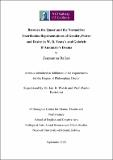| dc.contributor.advisor | Walsh, Ian | |
| dc.contributor.advisor | Bartoloni, Paolo | |
| dc.contributor.author | Balázs, Zsuzsanna | |
| dc.date.accessioned | 2022-03-04T10:59:11Z | |
| dc.date.issued | 2021-10-08 | |
| dc.identifier.uri | http://hdl.handle.net/10379/17000 | |
| dc.description.abstract | This doctoral thesis re-examines W. B. Yeats’s and Gabriele D’Annunzio’s drama through the lens of queer theory offering the novel contention that due to their involvement in queer and feminist subcultures, their plays offer “a rich archive of queer historical structures of feeling” (Love, Feeling Backward 24). Yeats’s and D’Annunzio’s dramatic imagination and ideas of gender and sexuality were considerably shaped by their queer/feminist networks: in Yeats’s case mostly by Florence Farr, Eva Gore-Booth, Oscar Wilde, Edward Martyn and William Sharp, while in D’Annunzio’s case Eleonora Duse, Sarah Bernhardt, Wilde, Sibilla Aleramo, Irma and Emma Gramatica, Marguerite Radclyffe Hall and Ida Rubinstein. This thesis demonstrates that these people’s androgyny, feminist ideas, ambiguous sexuality and sexual tension made Yeats and D’Annunzio more alert to the vicissitudes of marginalised subjectivities in society and created a dramaturgical tension between the queer and the normative in the scripts. This tension reflects the contradictory gender and sexual politics of twentieth-century Italy and Ireland and at the same time it has important implications for understanding the contemporary moment which yet again witnesses the rise of authoritarian regimes. This thesis draws on works by contemporary queer theorists, mostly Jack Halberstam, Heather K. Love, Elizabeth Freeman, Leo Bersani, José Esteban Muñoz, Sara Ahmed and Eve Kosofsky Sedgwick as well as works by French philosopher Didier Eribon and visual culture theorist Nicholas Mirzoeff. This research thus takes from Irish studies, Italian studies, queer theory, modernist, postcolonial, comparative as well as performance studies, combining and furthering various approaches and disciplines to open up new avenues of understanding Yeats’s and D’Annunzio’s drama today. | en_IE |
| dc.publisher | NUI Galway | |
| dc.rights | Attribution-NonCommercial-NoDerivs 3.0 Ireland | |
| dc.rights | CC BY-NC-ND 3.0 IE | |
| dc.rights.uri | https://creativecommons.org/licenses/by-nc-nd/3.0/ie/ | |
| dc.rights.uri | https://creativecommons.org/licenses/by-nc-nd/3.0/ie/ | |
| dc.subject | W. B. Yeats | en_IE |
| dc.subject | Gabriele D'Annunzio | en_IE |
| dc.subject | Irish drama and theatre | en_IE |
| dc.subject | modern Italian theatre | en_IE |
| dc.subject | Queerness | en_IE |
| dc.subject | Gender and sexuality studies | en_IE |
| dc.subject | normativity | en_IE |
| dc.subject | New Women | en_IE |
| dc.subject | Florence Farr | en_IE |
| dc.subject | Eleonora Duse | en_IE |
| dc.subject | anti-authoritarianism | en_IE |
| dc.subject | sadomasochism | en_IE |
| dc.subject | normative family | en_IE |
| dc.subject | feminism | en_IE |
| dc.subject | Oscar Wilde | en_IE |
| dc.subject | transvestism | en_IE |
| dc.subject | Arts, Social Sciences & Celtic Studies | en_IE |
| dc.subject | English and Creative Arts | en_IE |
| dc.subject | Drama Theatre and Performance | en_IE |
| dc.title | Between the queer and the normative: Unorthodox representations of gender, power and desire in W. B. Yeats’s and Gabriele D’Annunzio’s Drama | en_IE |
| dc.type | Thesis | en |
| dc.contributor.funder | Irish Research Council | en_IE |
| dc.local.note | This PhD thesis re-examines W. B. Yeats's and his Italian contemporary Gabriele D'Annunzio's drama in light of their queer and feminist networks, exploring the ways in which their plays can challenge imperialist, nationalist and normative paradigms of gender and sexuality even today. | en_IE |
| dc.description.embargo | 2025-10-07 | |
| dc.local.final | Yes | en_IE |
| nui.item.downloads | 0 | |


